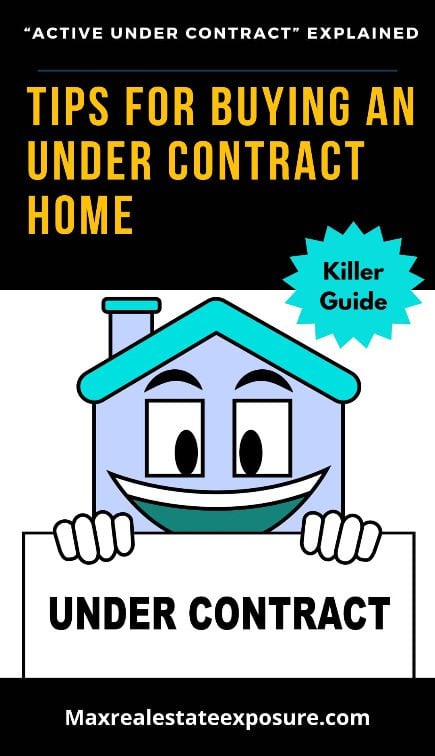 Do you know what active under contract means?
Do you know what active under contract means?
When looking to buy a home, you’re likely to encounter many terms and listing statuses you don’t know.
Understanding ‘active under contract’ in real estate is crucial for buyers navigating the market. Real estate agents label a house as ‘active under contract’ when they have accepted an offer, but they are still in the early stages of the deal and have not yet closed it.
Buyers can still make backup offers and visit the property with the seller’s consent. We will explore the pros and cons of buying a house under contract, tips for success, and what happens if the sale falls through.
From three decades of experience as a Realtor, many homes under contract but active in MLS fall through and never close.
We will explore the pros and cons of buying a house under contract, tips for success, and what happens if the sale falls through.
Understanding ‘Active Under Contract’ in Real Estate
When buying a house, it’s essential to grasp the ‘active under contract’ concept in the real estate market. This status indicates that the sellers have accepted an offer from a buyer, marking the beginning of the home sale process.
What does ‘active under contract’ mean?
‘Active under contract’ means that while the sellers have accepted an offer, the deal is still in its initial stages and has not yet closed. Buyers typically complete a home inspection during this phase and finalize their mortgage financing.
It’s important to note that even though the house is under contract, buyers can still make backup offers and visit the property with the seller’s consent.
Active under contract shares a similar meaning to contingent in real estate.
The stages of a home sale under contract
A home sale under contract goes through several stages. Once the sellers accept an offer, the buyer may conduct a home inspection to evaluate the property’s condition.
Simultaneously, the buyer works to secure their mortgage financing while the sellers complete any necessary repairs or address contingencies specified in the contract. The closing stage culminates in completing the final paperwork and transferring ownership from the sellers to the buyers.
Typically, homes stay contingent or active under contract from a couple of weeks to a few months.
Can you still make offers on a house that is active under contract?
Although a house is under contract, it is possible to make offers on it. However, these offers will be considered as backup offers. If the current sale falls through, the sellers may consider other offers, including backup offers.
Buyers can still visit the property and assess its suitability for their needs. Working closely with a real estate agent to evaluate the situation, understand the risks involved, and determine the best strategy for making a backup offer on an active house under contract is essential.
Contingent offers do fall through from time to time. Usually, it is because of a home inspection issue.
Most Common Contingencies in Real Estate
Home Inspection
Buyers will usually have a home inspected by a professional to understand its condition. When an inspection contingency is included, the buyer can discover any significant structural issues that may not have been disclosed.
This allows the buyer to decide whether to proceed with the deal or utilize the inspection results to negotiate. Buyers may ask for a reduction in the sale price, fixing the issue, or a seller concession.
Mortgage Financing
Even though the buyer obtained mortgage pre-approval for financing before making an offer, there is still a possibility that they may not get approved for a loan.
The lender carefully examines the loan application and may reject it even after the pre-approval stage. Considering this, most buyers include a financing or mortgage contingency in their offer.
Home Appraisal
An appraisal contingency is a condition in a real estate deal that states that the agreement is only valid if the property’s market value is equal to or higher than the agreed-upon contract amount. Buyers typically include this contingency because lenders can reject a home loan application if the property is appraised at a value lower than the contract price.
When the appraised value is lower than the sale price, there can be an appraisal gap that needs to be satisfied.
House Sale
When upgrading, the usual step is to purchase a bigger house. In this process, many individuals intend to sell their current home before making a new purchase. To ensure a smooth transition, buyers sometimes include a home sale contingency in their offer for the new house.
This contingency states that the offer will only be valid if the seller can sell their current home within a specified timeframe. People usually frown upon home sale contingencies unless it is a buyer’s market.
A seller loses control of their sale when accepting a home sale contingency.
Active Under Contract vs. Pending
 If you have seen the term “active under contract” in a property listing, you may have also encountered the term “pending.” Although they share similarities, there is an essential distinction between the two.
If you have seen the term “active under contract” in a property listing, you may have also encountered the term “pending.” Although they share similarities, there is an essential distinction between the two.
Before finalizing the deal, specific conditions or contingencies must be fulfilled when labeling a property as “active under contract.”
All parties successfully addressed all necessary contingencies when marking a property as “pending.” The transaction is progressing toward completion. Understanding that the finalization of the sale is not yet guaranteed is crucial, even if a property is under contract or a sale is pending.
See under contract vs. pending for a comprehensive comparison between these two listing statuses.
There is always a possibility that a transaction might experience delays or even be canceled. Therefore, if a property currently under contract or pending sale interests you, preparing an offer for it as a precautionary measure is advisable.
Pros and Cons of Buying a House that is Active Under Contract
Buying an active house under contract can have advantages and challenges. Understanding the risks and rewards involved is essential to make an informed decision.
Here are some key considerations:
Benefits of buying a house under contract
- Opportunity to secure a desirable property: Buying a house under contract allows you to potentially acquire a property that meets your criteria, even before it becomes available to other buyers.
- Potential negotiation leverage: As a backup buyer, you may have the chance to negotiate on price or terms if the initial buyer fails to fulfill their obligations.
- Time savings: You may be able to expedite the home-buying process compared to starting from scratch.
Potential challenges of buying a house under contract
- Risk of losing the opportunity: If the initial buyer completes the purchase, your backup offer may not be considered.
- Potential limitations on contingencies: Depending on the contract terms, you may have less flexibility to include certain contingencies, such as home inspection or financing.
- Uncertainty and potential for delays: The closing timeline may be uncertain as it depends on the success of the primary buyer’s transaction.
Assessing the risks and rewards
Before deciding to buy a house under contract, carefully weigh the advantages and challenges based on your specific circumstances and priorities. Consider factors such as your buying urgency, the property’s desirability, and the market competition.
Working closely with a trusted real estate agent can help you navigate the complexities of buying an active home under contract. They can provide valuable guidance, assess the risks, and help you determine the best action.
Tips for Successfully Buying a House that is Active Under Contract
 When buying an active home under contract, you must remember several important tips. By following these guidelines, you can increase your chances of a successful purchase:
When buying an active home under contract, you must remember several important tips. By following these guidelines, you can increase your chances of a successful purchase:
Working closely with your real estate agent
Your real estate agent is invaluable when buying a house under contract. They have the knowledge and expertise to guide you through the complexities and help you make informed decisions.
Stay close to your agent, ask questions, and rely on their advice to navigate the process smoothly.
Evaluating contingencies and financing options
Before making an offer, carefully evaluating the contingencies and financing options is crucial. Understanding the specific contingencies associated with the contract is essential. Inspection and financing contingencies will allow you to plan and address potential obstacles.
Additionally, thoroughly explore your financing options and ensure you have a solid plan to secure the necessary funds.
Making a solid backup offer
As a buyer making an offer on a house under contract, you must prepare to make a strong backup offer. This involves offering competitive terms and demonstrating your commitment to the purchase. Work closely with your agent to determine the best strategies for making a compelling backup offer that stands out.
By following these tips, you can position yourself for success in buying an active house under contract. Remember, each situation is unique, so working closely with your agent and staying informed throughout the process is crucial.
What happens if the Sale Falls Through?
When a sale falls through on a house that is active under contract, it can disappoint the buyer and the seller. However, it’s essential to explore alternative options for the seller and consider your position as a backup buyer.
Exploring alternative options for the seller
Sellers can relist the house and seek new offers if the initial sale falls through. They may need to reassess their pricing strategy or make necessary repairs or improvements to attract new potential buyers.
Sellers can work closely with their real estate agent to develop a plan and determine the best action.
Considering your position as a backup buyer
As a backup buyer, it’s crucial to remain prepared and patient. If the original sale fails, you may be able to step in and negotiate with the seller.
Communicate your continued interest to your agent and stay updated on the status of the property. Being proactive and responsive can increase your chances of securing the deal.
Preparing to move quickly if the deal falls apart
If the deal falls apart, time is of the essence. Stay in close contact with your agent and be ready to act swiftly. Have the necessary documents and financial arrangements in order. Ensure you are pre-approved for financing or have proof of funds to demonstrate your readiness to proceed.
Being proactive and prepared can give you an advantage in securing the house if it becomes available again.
About the Author: The above Real Estate information on what active under contract means was provided by Bill Gassett, a Nationally recognized leader in his field. Bill has expertise in mortgages, financing, moving, home improvement, and general real estate.
Learn more about Bill Gassett and the publications he has been featured in. Bill can be reached via email at billgassett@remaxexec.com or by phone at 508-625-0191. Bill has helped people move in and out of Metrowest towns for the last 37+ years.
Are you thinking of selling your home? I am passionate about real estate and love sharing my marketing expertise!
I service Real Estate Sales in the following Metrowest MA towns: Ashland, Bellingham, Douglas, Framingham, Franklin, Grafton, Holliston, Hopkinton, Hopedale, Medway, Mendon, Milford, Millbury, Millville, Natick, Northborough, Northbridge, Shrewsbury, Southborough, Sutton, Wayland, Westborough, Whitinsville, Worcester, Upton, and Uxbridge MA.

